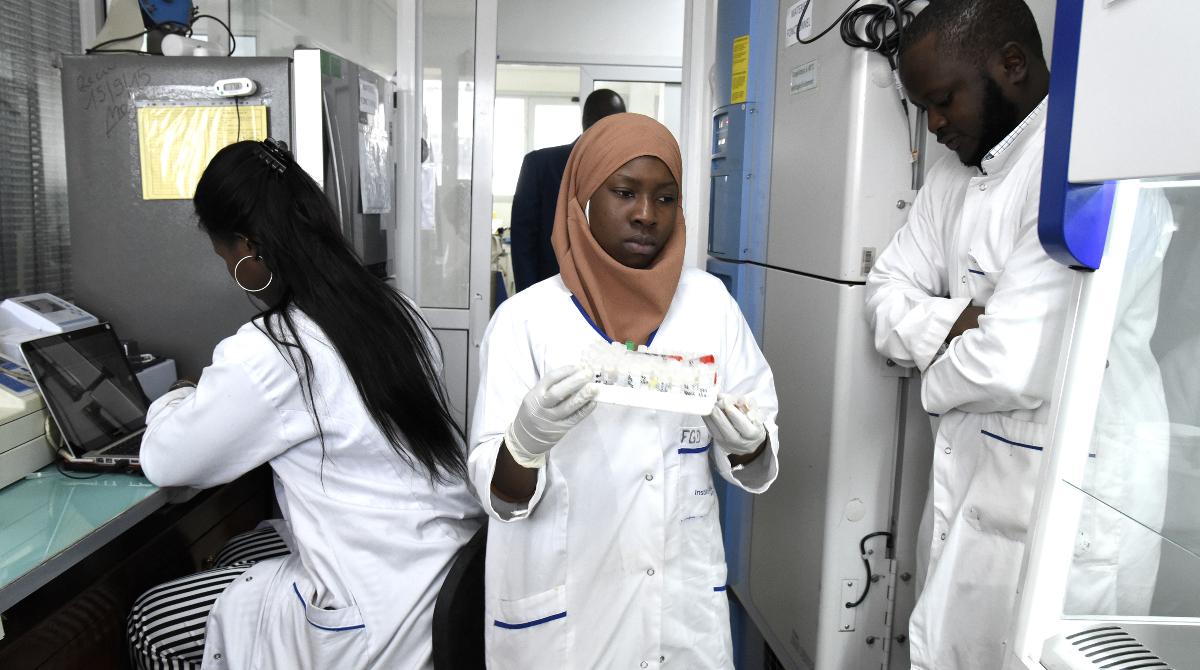As the world started shutting down in mid-March, the head of the World Health Organization, Tedros Adhanom Ghebreyesus, sent out a simple message to countries: “Test, test, test.”
“You cannot fight a fire blindfolded,” he added.
But producing a quick, reliable and affordable test for the new coronavirus hasn’t been easy. In Africa, there are currently around 50,000 confirmed cases of the coronavirus, though experts suspect that number to be vastly underreported due to lack of widespread testing.
Related: Coronavirus lockdown: A tale of two South Africas
Enter one team of researchers in Senegal that is working on a solution for the entire continent.
“The purpose is to serve all countries in Africa,” said Dr. Amadou Sall, the head of the Pasteur Institute in Dakar.
Sall and his team are working in partnership with a British biotech company called Mologic to develop a 10-minute rapid detection test kit that could be available by early June.
Together, the Pasteur Institute and Mologic are working on two kinds of tests; a saliva swab for people who think they’re infected, and a finger prick for people who want to know if they’ve had previous exposure to the virus.
It will be sold at cost price, which is about a dollar, thanks to grant support from the government of the United Kingdom and the Bill and Melinda Gates Foundation. And the entire test — results included — can be done at home. No need for a lab with fancy equipment.
Related: Lebanon protests called out corruption. Now it’s about survival.
“In an African context, where you need to reach a remote population and a lab is not well-equipped, this is a huge advantage.”
“In an African context, where you need to reach a remote population and a lab is not well-equipped, this is a huge advantage,” Sall said.
Reaching remote, rural populations is one of the biggest challenges to achieving widespread testing in Africa. About 60% of sub-Saharan Africa is rural.
Once approved for manufacturing, the test kits will be made at a newly built facility in Dakar. According to Sall, it could produce up to 4 million test kits a year.
For Michel Yao, the director for emergency response at WHO Africa, having a test that can be manufactured in Africa solves another important hurdle: market access.
“African countries have less access to the global market because these items are mainly manufactured in developed countries,” Yao said.
Related: Mexico faces US pressure to reopen American factories amid coronavirus
That’s why he says having a local production line could be a game-changer.
But there’s a third layer of challenges to achieving widespread testing in Africa: fear and suspicion.
Bronwyn Bruton works with the Africa Center at the Atlantic Council in Washington, DC. She says that in many countries, government trust is low, trickling all the way down to the public health sector. She points out reactions to the recent Ebola outbreak.
“There have often been cases of communities attacking health care workers who try to administer vaccines and testing because they fear that these people are there deliberately [trying to] spread disease.”
“There have often been cases of communities attacking health care workers who try to administer vaccines and testing because they fear that these people are there deliberately [trying to] spread disease,” she said.
Another factor that goes hand in hand with fear is stigma.
“We saw this with the HIV/AIDS epidemic. A lot of people who tested positive for the disease are stigmatized,” Bruton said.
Related: Is Vietnam the coronavirus-fighting champ of the world?
Last month, a group of people in the Ivory Coast’s capital Abidjan burned down a COVID-19 testing facility over fears that the center could become a vector for the disease, spreading it to the neighboring community. How countries grapple with stigma, Bruton says, will take more than a solid test.
“It’s a tremendous societal challenge, and to be completely fair, this is something that’s hardly restricted to Africa,” she said. “If you read the paper in the US, you’ll see reports of terrible xenophobic attacks on people of Asian origin. In Africa, people are no different, and there is some basis for fear when you’re talking about the coronavirus because it is highly contagious.”
Sall, for his part, says he’s focused on the immediate task in front of him — producing a solid at-home test that can be distributed to as many people as possible.
“We’re in it now,” he said.
And once you’re in it, all you can do is fight.
Our coverage reaches millions each week, but only a small fraction of listeners contribute to sustain our program. We still need 224 more people to donate $100 or $10/monthly to unlock our $67,000 match. Will you help us get there today?
